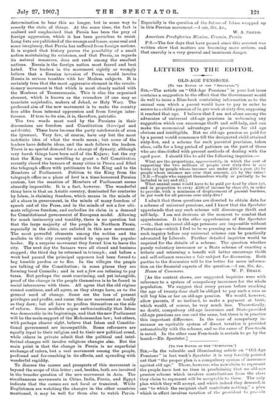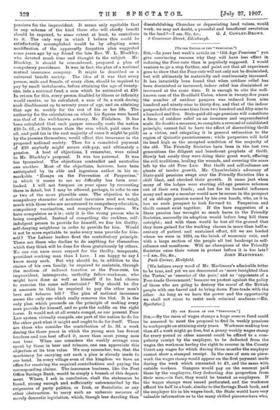1 - T0 Tun EDITOR OF THE " SCEMATOR."1 Sin,—In the valuable
and illuminating article on "Old-Age Pensions" in last week's Spectator it is very forcibly pointed out that "the proper plan is a compulsory system of insurance against old age." Those, however, who now claim to represent the people have lost no time in proclaiming that no old-ago pension scheme which involves contributions from the class they claim to represent will be acceptable to t hem. The only plan which they will accept, and which indeed they demand, is one "to which the recipient shall contribute nothing," a plan which in effect involves taxation of the provident to prom ide pensions for the improvident. It seems only equitable that in any scheme of the kind those who will chiefly benefit should be required, to some extent at least, to contribute to it. The only way in which I believe this could be satisfactorily accomplished would be by adopting some modification of the apparently forgotten plan suggested some years ago by my friend the late Rev. W. L. Blackley, who devoted much time and thought to the subject. Mr. Blackley, it should be remembered, proposed a plan of compulsory providence. It was, in fact, the plan of a national mutual insurance company. It might be described as a universal benefit society. The idea of it was that every person, male and female, of every class, should be required to pay by small instalments, before attaining the age of twenty- bite, into a national fund, a sum which he estimated at £10. In return for this, every person disabled by illness or infirmity would receive, so he calculated, a sum of 8s. a week during such disablement up to seventy years of age, and on attaining that age 4s. weekly for the rest of his or her life. The authority for the calculations on which his figures were based Was that of the well-known actuary, Mr. Finlaison. It has been calculated that each pauper annually costs the nation £10 5s. 6d., a little more than the sum which, paid once for all, and paid (as in the vast majority of cases it might be paid) by the persons themselves, would effect this insurance in the proposed national society. Thus for a completed payment of £10 anybody might secure sick-pay, and ultimately a pension. A host of objections, I remember, were raised to Mr. Blaekley's proposal. It was too paternal. It was too tyrannical. The objections contradict and neutralise one another. Most of the objections, however, have been anticipated by its able and ingenious author in his re- markable "Essays on the Prevention of Pauperism," in which it seems to me no difficulty has been over- looked. I will not trespass on your space by recounting these in detail, but I may be allowed, perhaps, to refer to one or two of the more plausible ones. The objection to the compulsory character of national insurance need not weigh much with those who are accustomed to compulsory education, compulsory vaccination, and compulsory Poor-rates. We have compulsion as it is ; only it is the wrong person who is being compelled. Instead of compelling the reckless, self- indulgent person to provide for himself, we fine his thrifty, self-denying neighbour in order to provide for him. Would it not be more equitable to make every man provide for him- self P The Labour leaders flout the contributory principle. There are those who decline to do anything for themselves which they think will be done for them gratuitously by others. No one can have more respect for the thrifty, temperate, provident working man than I have. I am happy to say I know many such. But why should he, in addition to the claims of his own family, be required to maintain, through the medium of indirect taxation or the Poor-rate, his improvident, intemperate, unthrifty fellow-workman, who might have done as well as himself if be had chosen to exercise the same self-restraint ? Why should he (for it amounts to this) be required to pay the other man's beer and tobacco bill ? The plan of national insurance seems the only one which really removes the blot. It is the only plan which proceeds on the principle of making every man provide for himself, and so puts the saddle on the right horse. It would not at all events compel, as our present Poor Law system virtually compels, one part of the nation to do for the other part what it might and ought to do for itself. There are those who consider the contribution of is. 3d. a week during the three years in which the young man has fewest burdens and can best afford it, more than most young men can bear. When one considers the weekly average suns spent by these in beer and tobacco, one can appreciate this objection at its true value. We may remember, too, that the machinery for carrying out such a plan is already made to our hand. In every village even of the kingdom we have an office for receiving the required contributions and paying the corresponding claims. The insurance business, like the Post Office Savings Bank, would be simply a branch of this depart- ment. Where, I ask in conclusion, shall the statesman be found, strong enough and sufficiently untrammelled by the exigencies of party politics, or Irish, or Socialistic, or any other obstruction, to carry such an unheroic measure of merely domestic legislation, which, though less dazzling than
disestablishing Churches or depreciating land values, would work, we may not doubt, a peaceful and beneficent revolution







































 Previous page
Previous page